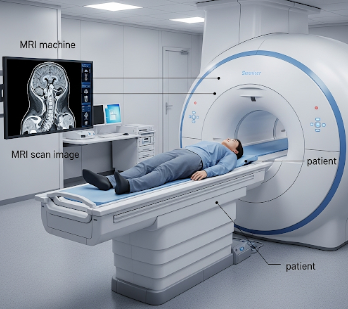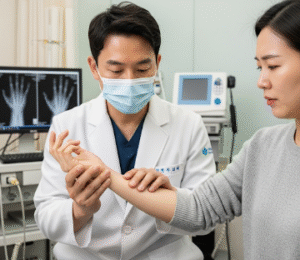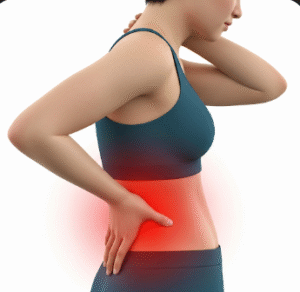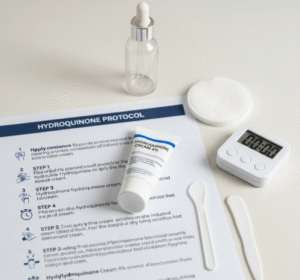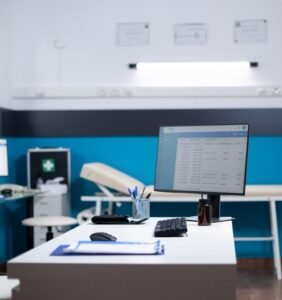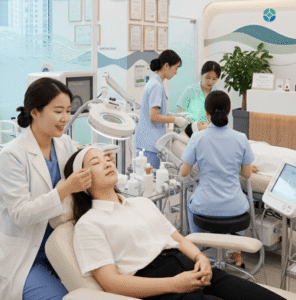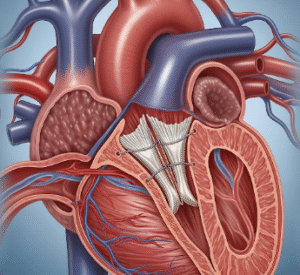Overview
Magnetic Resonance Imaging (MRI) is a non-invasive diagnostic imaging technique that uses strong magnetic fields and radio waves to produce detailed images of internal organs, tissues, and structures. It is widely used to detect, diagnose, and monitor a variety of medical conditions without the need for radiation exposure.
In Korea, MRI scans are performed in advanced medical centers with high-field MRI machines by experienced radiologists, ensuring high-resolution imaging, patient comfort, and rapid results.
Highlights:
- ✅ Non-invasive imaging of organs, tissues, and bones
- ✅ No ionizing radiation, making it safer than X-rays or CT scans
- ✅ High accuracy for diagnosis of neurological, musculoskeletal, cardiovascular, and abdominal conditions
What is Magnetic Resonance Imaging (MRI)?
MRI uses powerful magnets and radiofrequency waves to generate cross-sectional images of the body. Unlike X-rays or CT scans, MRI does not use ionizing radiation, making it safe for repeated use.
Indications include:
- Brain and spinal cord evaluation (e.g., tumors, stroke, or multiple sclerosis)
- Musculoskeletal imaging (e.g., ligaments, cartilage, or joints)
- Cardiovascular assessment (e.g., heart structure and blood flow)
- Abdominal and pelvic imaging (e.g., liver, kidneys, ovaries, and uterus)
- Detection and monitoring of tumors and other pathologies
Important: MRI provides high-resolution, detailed images that help doctors diagnose conditions accurately and plan treatment effectively.
What are the benefits?
- Detailed imaging: Excellent soft tissue contrast and high-resolution images
- Non-invasive and safe: No exposure to ionizing radiation
- Diagnostic accuracy: Detects abnormalities that may not appear on X-rays or ultrasound
- Versatile use: Can image the brain, spine, joints, abdomen, heart, and blood vessels
Key benefits highlighted:
- ⚡ Accurate diagnosis of complex conditions
- ⚡ Safe for repeated use
- ⚡ Can help guide surgical or therapeutic interventions
- ⚡ Painless and generally well-tolerated
Procedure Details
1) How should I prepare for an MRI?
- Medical history: Inform the radiologist about implants, pacemakers, metal objects, or pregnancy
- Clothing and accessories: Remove metal objects, jewelry, watches, and belts
- Fasting: Required for abdominal or pelvic MRI with contrast
- Contrast considerations: Some MRIs use contrast dye; inform the doctor of allergies or kidney issues
- Relaxation: Patients should remain calm and still during the procedure
2) What happens during an MRI?
- Positioning: Patient lies on a movable table that slides into the MRI machine
- Imaging process: Strong magnetic fields and radio waves create detailed images
- Contrast administration (if needed): A special dye may be injected intravenously to enhance image quality
- Communication: Patient can communicate with the radiologist through an intercom; earplugs or headphones reduce noise
- Duration: Typically 30–60 minutes depending on the area being scanned
3) What happens after an MRI?
- Immediate results: Basic images can be reviewed immediately; detailed interpretation is done by a radiologist
- Normal activity: No recovery period; patients can resume daily activities immediately
- Follow-up: Doctor discusses results and plans further tests or treatment if needed
Highlights for post-procedure care:
- ⚡ Minimal side effects; rare allergic reactions to contrast dye
- ⚡ Stay hydrated if contrast was used to help flush it from the body
- ⚡ Resume normal diet and activities immediately
- ⚡ Follow-up with referring doctor to review MRI results
Risks / Benefits
Risks:
- Claustrophobia or anxiety during the scan
- Rare allergic reaction to contrast dye
- Not suitable for patients with certain metal implants or pacemakers
- Loud noises from the MRI machine (ear protection recommended)
Benefits:
- High-resolution, detailed images for accurate diagnosis
- Safe and non-invasive, without ionizing radiation
- Useful for a wide range of medical conditions
- Helps plan treatment or surgical procedures effectively
Recovery and Outlook
- Hospital stay: Usually outpatient; no hospitalization required
- Full recovery: Immediate; no downtime is needed
- Long-term outlook: Excellent, as MRI is a safe, repeatable imaging tool for monitoring conditions
- Follow-up: Radiologist interprets images; referring doctor discusses findings and next steps
Tips for optimal experience:
- ✅ Wear comfortable clothing without metal
- ✅ Inform the staff of implants or medical conditions
- ✅ Stay still during imaging for best results
- ✅ Use relaxation techniques if anxious or claustrophobic
When To Call the Doctor
- Signs of allergic reaction after contrast dye (rash, itching, swelling)
- Severe anxiety or claustrophobia preventing completion of MRI
- Any delayed complications following contrast administration (rare)
Best Korea Option / Process
Korea provides advanced MRI services:
- Top hospitals: Equipped with high-field MRI machines and expert radiologists
- Advanced imaging techniques: 3T MRI, functional MRI, cardiac MRI, and contrast-enhanced imaging
- Safety protocols: Strict screening for implants, allergies, and patient comfort
- Post-imaging support: Interpretation by specialized radiologists and consultation with referring physicians
- International patient support: Online consultation, appointment scheduling, and telemedicine follow-up
Step-by-step process in Korea:
- Online consultation and pre-scan instructions
- Pre-scan screening for implants or allergies
- MRI scan performed with or without contrast
- Immediate preliminary images reviewed by radiologist
- Detailed report sent to the patient and referring doctor for diagnosis and treatment planning

